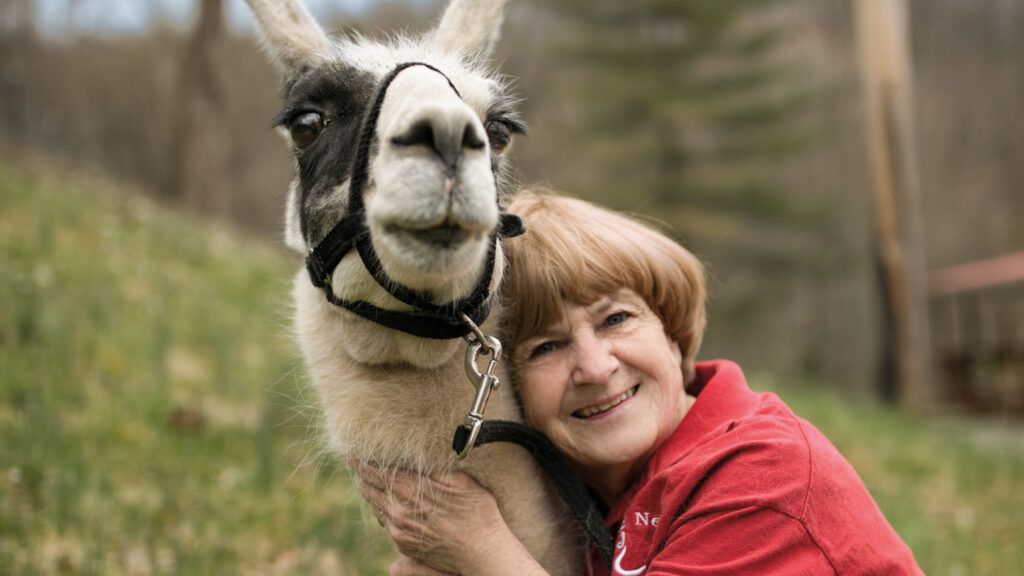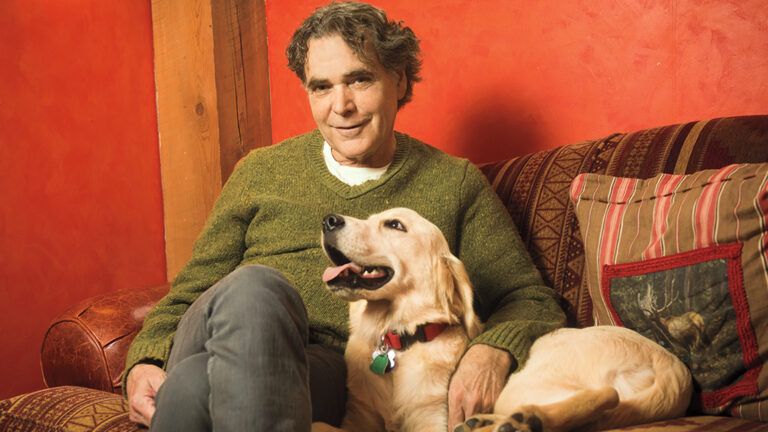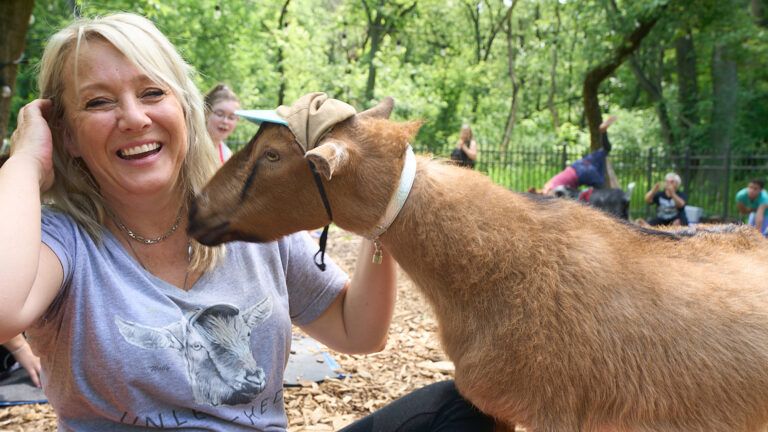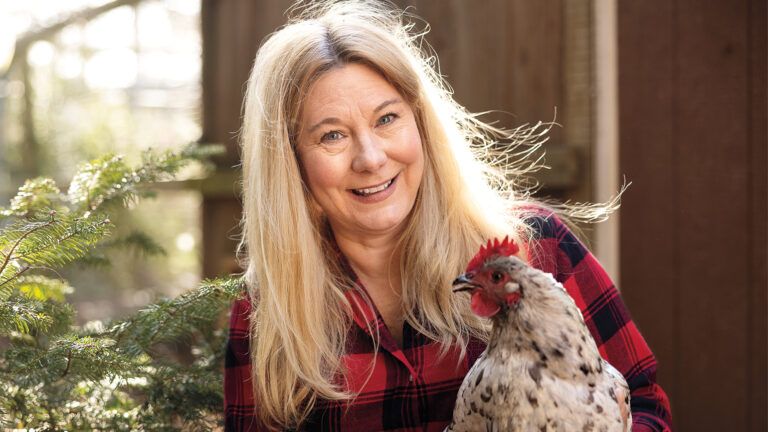My husband, Tom, had come up with more than a few crazy ideas in our 29 years of marriage, but this one topped them all. “We are not buying a llama,” I told him. “No way.” We had just driven home after spending the afternoon at a huge llama exhibition and show on the Ohio State Fair grounds. We had gone there for the dog show, where for five years we’d shown our beloved boxer. Roxie was a beautiful champion show dog whom I’d loved as if she were one of our children. She’d drawn us into a life I could never have imagined. Roxie came into our lives when she was a puppy and everything changed. Summer weekends were spent going to shows across the region. It became all-consuming.
For months, we didn’t even go to church. That was the one drawback about showing dogs. But I’d so enjoyed it—the competition, the people we met, the time bonding with Roxie. I was sure God understood. Then, at six years old, Roxie was diagnosed with an inoperable brain tumor and died. Nearly a year later I was still heartbroken. I’d thought coming to the show would be a way to relive happy memories, but all I felt was sadness. “I can’t do this,” I’d told Tom halfway through. We left the arena. Just outside the doors was a huge sign: “Come see the llamas.” “Let’s check it out,” Tom said. I thought he was joking. An hour later we were still walking past pen after pen of these leggy, furry animals. Tom was fascinated, peppering the farm owners with questions and getting their business cards.
The whole three-hour drive back to our 32-acre hillside hobby farm, Tom was lost in thought. “Sometimes I feel like we should be doing something more with our lives,” he said, as much to himself as me. At last we pulled into the driveway. Tom announced, “I’m going to buy a llama.” He’d always been like this, impulsive and full of ideas. Wanting to buy the farm when we were just starting out in our marriage, volunteering us to teach Sunday school and then to lead a youth group. Never mind that we had no experience—he just leaped in and trusted God to figure out the details. I was more cautious and liked to weigh all the pros and cons. God gave us brains so we could think things through, right? And I couldn’t see anything good about this. Why llamas, and what would we do with them?
“There’s good money to be made in breeding them,” Tom said. “The breeders mentioned there’s a huge demand, and it could supplement our retirement.” I was 50. Tom was 52. I was glad he was thinking about our future, but still, llamas? “It seems too risky,” I said. We’d raised a few horses and cattle, not that we’d ever gotten rich off it. Tom let the subject drop. I noticed he kept all the llama farm business cards on his dresser, though. A couple of months later he called me at work. “There’s a llama farm north of Columbus,” he said. “I want to go have a look this weekend.”
More than 100 llamas ambled about the farm’s rolling fields. Tom was like a kid in a candy store. Was this the future he envisioned for us? Llamas everywhere? We both worked full-time, Tom for a plastics manufacturer, me in the computer department of Marshall University’s school of medicine. Solid, dependable jobs. One llama in particular, a spindly-legged fuzzy brown-and-white baby, took a liking to Tom. Her name was Emily. She followed him like a puppy. “How can we resist?” Tom said. “Let’s just start with her.” I still wasn’t feeling it, but how much trouble could one little llama be? “Okay,” I said. “You’ll need to get two,” the breeder added, not so helpfully. “They’re herd animals. They don’t do well alone.”
Six months later, when they were old enough to be weaned, we brought home Emily and a solid brown male baby named Fabian. We opened the back doors of the trailer and the llamas walked into our freshly mown field. Emily nosed the grass and began nibbling. Fabian sniffed the air around him. I can’t explain it, but something took hold of me. There were just the two of them, surrounded by open field, their wool sun dappled. It seemed as if they were exactly where they belonged, as if God had reached down and placed them on our farm himself. Was he trying to tell me something? “They’re beautiful,” I said. “They really are.”
Tom nodded, but he had that faraway look again. What now? I thought. A few days later I found out. “We should take the llamas out to places where folks can meet them,” he said. “Nursing homes, schools—that kind of thing.” I remembered the breeder stressing that it was important to get the word out, to have people interact with the llamas, in order to build a successful breeding operation. I hadn’t thought we’d start right away, though. “I’ve been praying for a way for us to get involved in some sort of ministry outside of church,” Tom said. “The llamas could be the answer. They’ll be a conversation starter for sure.”
An animal ministry? I thought about Roxie and all the places we’d taken her. People constantly came up to us, wanting to pet her. But I’d never seen it as a chance to talk about God. If anything, the dog show circuit had pulled me away from church, from practicing my faith. I’d regretted that. Now it was as if God was giving us a chance for a do-over. With llamas, of all things. “We could call our farm Good News Llamas,” Tom said, “and we can share the good news of Jesus Christ where we go.” A few days later I called a nursing home in our area. They were thrilled to have us visit. The residents’ faces lit up when they saw Emily and Fabian.
“I’ve never seen a llama in real life,” one woman said. She couldn’t stop petting Emily. The llamas were as gentle as could be. We didn’t talk directly about God, and yet there was no doubt that he was there, working through us, bringing joy and laughter to people. Not long after that we visited a school. A boy came up to Fabian, a scowl on his face. He was dressed all in black. Everything about him said, “Leave me alone.” Yet he buried his head deep in Fabian’s wool, holding the llama tight for nearly 20 minutes.
Fabian never tried to pull away. He connected with this boy in a way I never could have imagined. At the end of our visit, a teacher told me, “That boy comes from a very difficult family situation. I’ve never seen him show any kind of affection.” I found myself spending more and more time with our llamas, and it wasn’t just to learn how to keep them healthy and happy. Emily still followed Tom around like a puppy. Every night when he came home from work she was by the fence, waiting for him. When Emily and Fabian were nearly a year old, the breeder told us we needed to separate them so they wouldn’t mate too young.
Of course, that meant buying two more llamas so everyone could have a friend. When we finally began breeding them, the babies were so cute I couldn’t bear to part with them. So much for our retirement income. Every year we welcomed two or three new llamas to the herd that became part of our family. I heard about all the uses for llama fiber, and from that came an entirely new ministry. Our daughter, Mitzi, started Wooly Mountain Ministries, speaking at churches and using llama wool and her spinning wheel to share the message of Jesus Christ. I too learned how to spin the fiber into yarn, perfect for knitting and crocheting. I began teaching spinning, dyeing and felting.
We went to more schools and nursing homes, festivals and parades, even the llama show on the Ohio State Fair grounds—the place where it all began. Our schedules got so busy, we ultimately left our jobs to devote more time to the ministry. The llamas turned out to be a wonderful retirement plan after all! Today we have a herd of 18, including Emily. She’s 23 now and still loves meeting people. People are drawn in by the llamas, but they also ask about the ministry’s name. “What do you mean by good news?” they say. I tell them of God’s love and how he wants the best for each of us, if only we allow ourselves to trust and go where he leads us.
Did you enjoy this story? Subscribe to All Creatures magazine.




